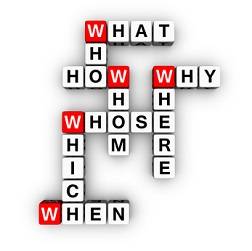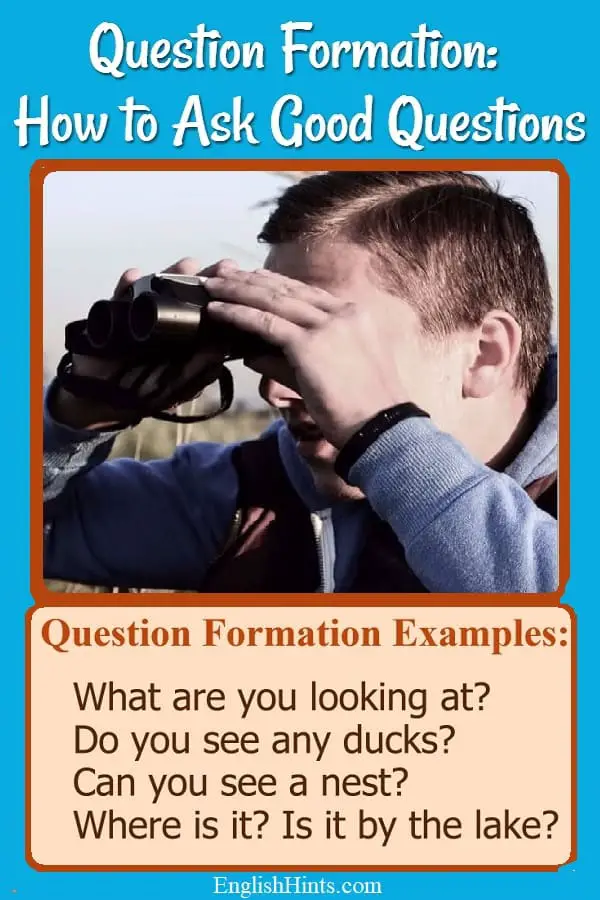Are You Confused by English Question Formation?
Question formation in English is different from the formation of other sentences in two main ways. First, the beginning word order is reversed.
Instead of beginning with the subject, questions begin with a helping verb. (Information questions begin with a question word like ‘who’ or ‘what’ and then the helping verb.)
The subject comes after the helping verb. The main verb follows the subject, and the rest of the sentence follows it.
Second, questions almost always need a helping verb along with the main verb. (This is also true for negative sentences but not affirmative statements.)
The most common helping verb is 'do.' 'Do' (or 'does' or 'did') doesn't change the meaning of a question but alerts the listener that a question is coming.
Other helping verbs include can, could, should, would, will, have or had, and be (is, are, etc.). We use have or had with the present or past perfect tenses. (Have you seen a doctor about your problem? Had you noticed any dizziness before you fell?)
The verb ‘be’ can be used without a helping verb. It is a helping verb for the continuous tenses, but it can also stand alone. We don’t use the verb ‘do’ together with ‘be,’ except as a negative command: Don't be late!" See the examples below for the usual ways to use 'be.'
The helping verb at the beginning of a question is important for communication. It tells us to listen for a question. So do question words like 'who' 'how.' or 'what.'
2 Kinds of Questions

English has two kinds of questions.
When we are asking for information we begin a question with a ‘Wh-‘ question word.
That means who, what, when, where, why, or how. (Less common Wh- words include whom, which, how many, how much, how long, etc.)
When we just need a yes or no answer, we omit the question word and begin directly with the helping verb.
See the charts below for examples of each kind of question in health care settings.
Information (Wh-) Questions
Information Questions (Who, What, Where, etc.) have five parts:
1. Question Word 2. Helping Verb 3. Subject, 4. Main Verb (usually base form), & 5. The rest of the sentence (if any.)
What do you want for dinner?
*What meds has the M.D. prescribed?
Where does the E.R. keep bandages?
When can I take a break?
When did the pain start?
How do you feel this morning?
How much do you weigh?
How often should I take this?
*How long have you had this cough?
*How long has he been sick?
*What color is the pill?
*When are you going to have surgery?
Why didn't you listen to the doctor?
Yes or No Questions
|
|
Helping Vb/Subject/Main Verb/The Rest
Do you take any pills?
Does Ms. Jones have children?
Didn't you know about it?
Should I give the IV now?
Can you feel this?
*Has he seen a specialist?
*Have you taken this before?
Are you ready now?
*Was the doctor listening to his lungs?
*Note:
- for perfect tenses the helping verb is ‘have’ and the main verb is in past participle form.
- For continuous tenses the helping verb is ‘be’ and the main verb is in the present participle form (-ing).
Related Pages:
Do you have questions about English sentence structure? Check out these explanations & examples. (Some include phrases and direct or indirect objects).
Learn the basic forms of English verbs to increase your confidence in English.
How to make negative sentences in English: a guide to helping verbs, negative words, and traps to avoid, with examples of each.
Home > English Grammar Lessons > Question Formation.
Didn't find what you
needed? Explain what you want in the search box below.
(For example, cognates, past tense practice, or 'get along with.') Click to see the related pages on EnglishHints.
| site search by freefind | advanced |









